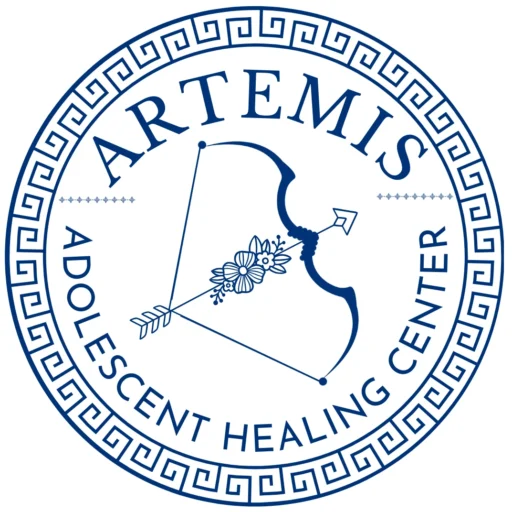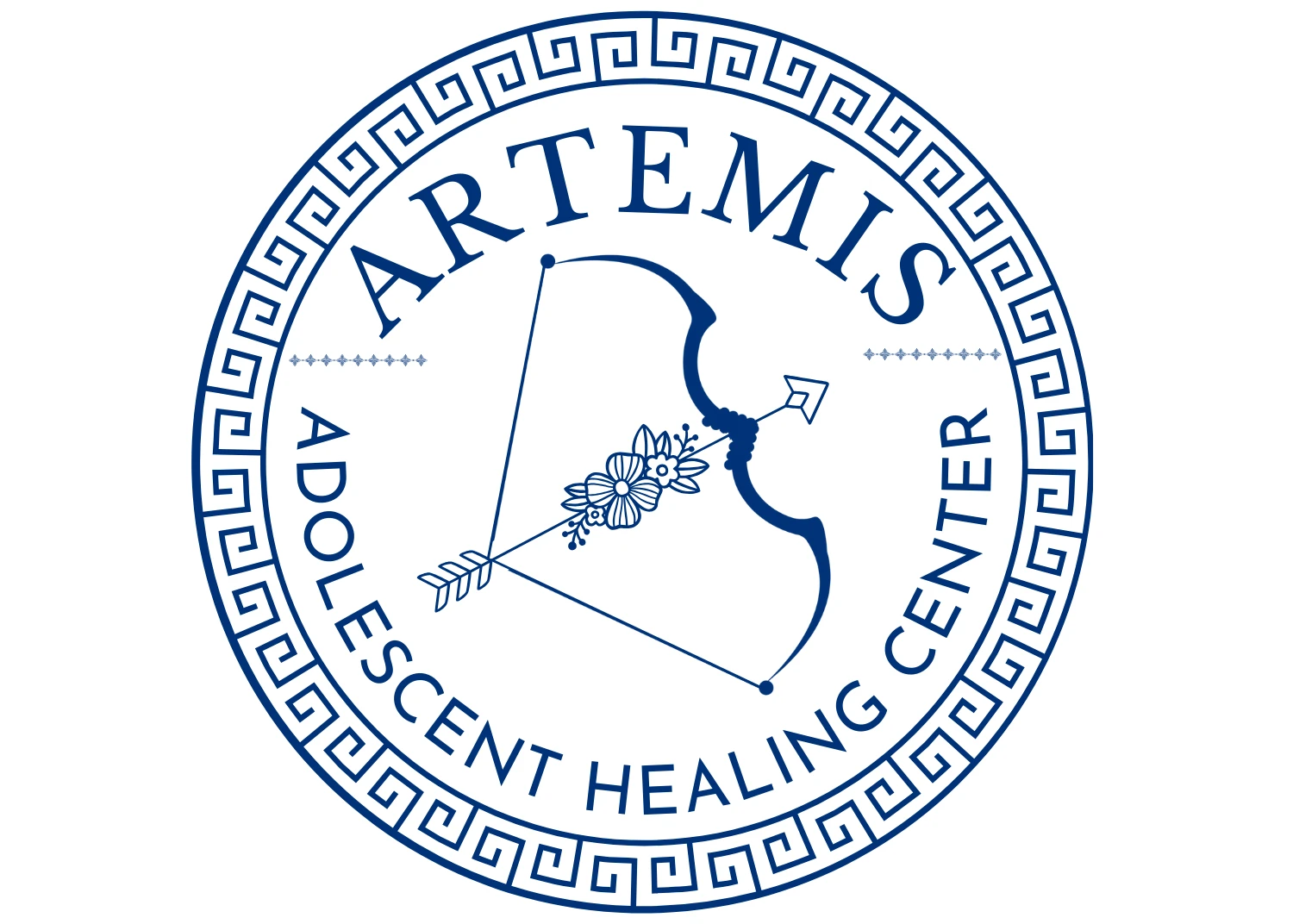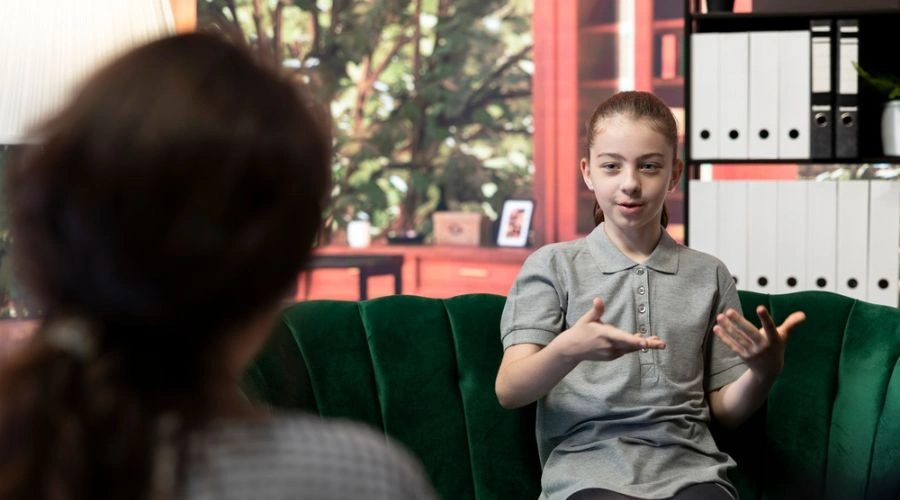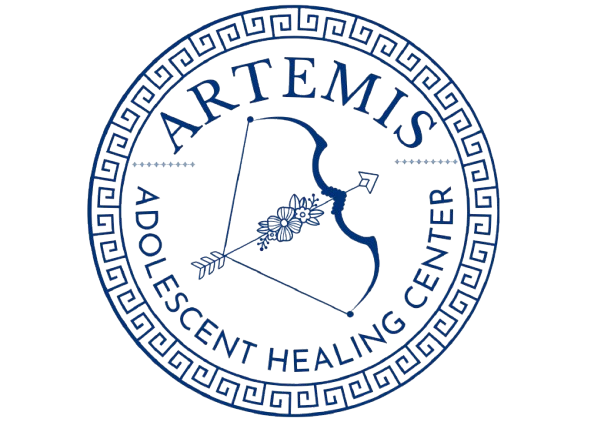Our Bipolar Disorder Treatment Program for Teens at Artemis
Feeling lonely sometimes is just part of being human. However, if you have bipolar disorder, your chances of feeling lonely increase. This, in turn, worsens your mental health, especially as a teenager when your emotions are already a wild ride. Luckily, with early diagnosis and appropriate treatment, you can reduce the impact of bipolar disorder on your daily life.
Artemis Adolescent Healing Center in Tucson, Arizona, specializes in adolescent psychiatry. We offer various support options for teen bipolar treatment.
Our experts recognize the differences between adolescents’ and adults’ mental health issues and offer the safest options for treating mental health problems.
If you’re searching for information on bipolar disorder diagnosis and evidence-based treatment options, read on. This page will give you a complete overview of the symptoms, the different types of teen bipolar disorder in children, and treatment options.
Get Confidential Trauma and Bipolar Assessment
What is Bipolar Disorder and is it a Common Condition?
Around 1 in 100 people develop bipolar disorder at some point in their lives. Studies indicate about 6 in 1,000 people get bipolar I, and about 4 in 1,000 people get bipolar II.
According to the American Psychiatric Association, Bipolar disorder is a psychological condition that causes unpredictable mood and energy changes. This eventually affects your ability to function like a normal person. People who have bipolar disorder go through intense emotional states that last for days to weeks.
You can put these mood episodes in the following categories:
- Manic or hypomanic: You are in a manic or hypomanic episode if you experience emotional highs. For example, being extremely happy, silly, or irritable.
- Depressive: A depressive episode is characterized by feelings of extreme sadness, a period of persistent low mood, and loss of interest.
Teenagers with this condition also have periods when their mood is stable and normal.
Bipolar disorder can occur at any point in your life. In some cases, symptoms can be spotted in childhood. It is also a major cause of disability and high premature mortality rates caused by suicide and medical comorbidities.
However, with compassion, proper awareness, and open communication with your child, you can reduce the risk of unfortunate occurrences associated with a mental health condition. Alongside professional help, scheduling regular check-ins with your child can also be beneficial.
How is Bipolar Disorder in Teens Diagnosed?
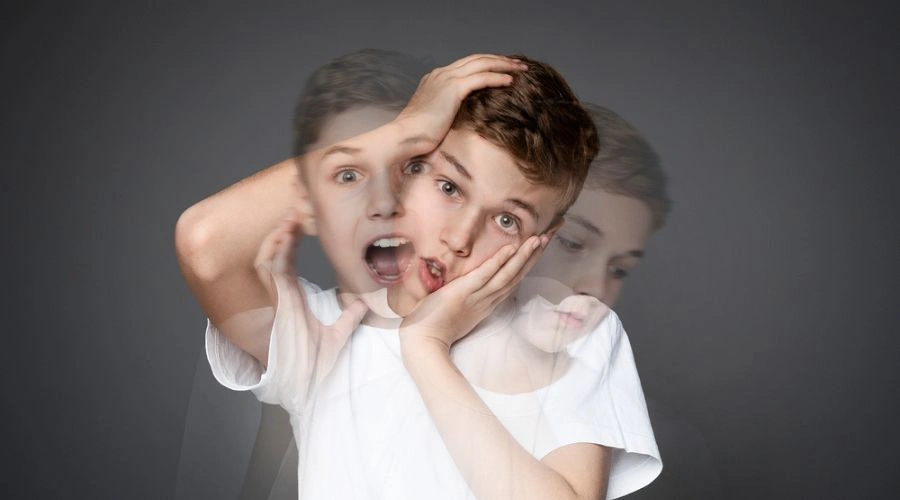
Teens with bipolar disorder diagnosed are often misdiagnosed. That’s because they exhibit symptoms similar to other psychological conditions. In many cases, it’s mistaken for depression, which causes a delay in receiving proper treatment. Early diagnosis and intervention can help your child better manage their condition.
If you believe your child has been misdiagnosed with bipolar disorder, you should seek a second opinion from another mental health professional. Try to connect with professionals specializing in children and adolescent psychiatry, such as Artemis Adolescent Healing Center. Clearly communicate your concerns about your child’s current healthcare provider and discuss alternative diagnoses and treatment options.
What are the Types of Bipolar Disorder That Can Affect Teenagers?
Bipolar disorder presents itself in various ways. It can be categorized into:
Bipolar I disorder
This condition causes a hypomanic or depressive state followed by at least one manic episode. Sometimes, mania may result in dissociation from reality, also known as psychosis.
Bipolar II disorder
This condition causes at least one major depressive episode and at least one hypomanic episode. However, in this case, you don’t experience a manic episode.
Mixed Episode Bipolar Disorder
In this type of Bipolar Disorder, you experience manic and depressive states at the same time and/or alternate very quickly between them.
Cyclothymia
This condition is less severe as compared to Bipolar disorder I and II. It’s marked by periods of hypomania and depressive symptoms lasting at least two years or one year in children and teens.
Teen vs. Adult Bipolar Disorder
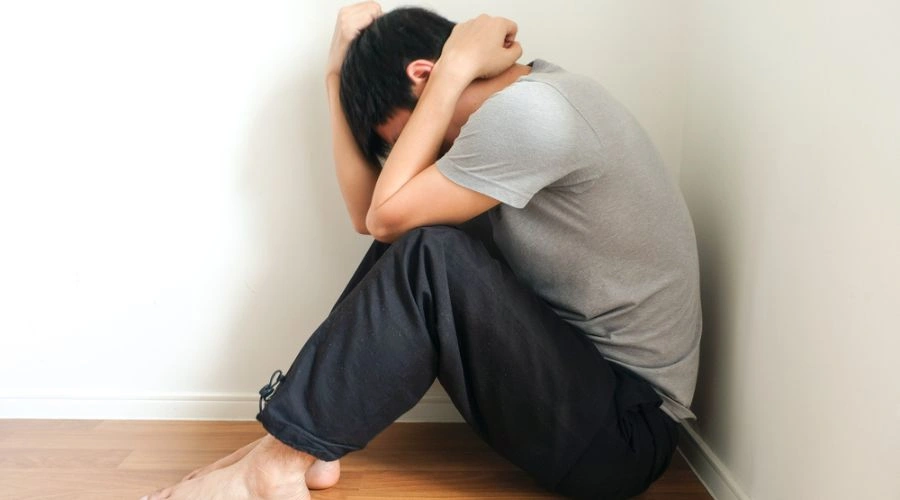
The National Institute of Mental Health states that Bipolar Disorder affects over 5.7 million American adults. This makes about 2.6% of the U.S. population age 18 and older in a given year. It develops in about 1-5% of children and teens under 18.
When you develop the disorder in childhood or teenage years, it is known as the early onset form of bipolar disorder. The typical onset for this psychological condition is 25 years of age. But you may also develop it as early as a child or as late as 40.
Years of research show that this disorder has different characteristics in children and teens than adults. It affects mood, emotions, and perceptions differently in each age group. Studies also indicate that the difference in experience could be due to different brain development stages.
As a teenager, the grey matter in your brain is still developing. This part of your brain comprises most of your neurons and is known as the thinking part of the brain. However, your brain’s grey matter is fully developed as an adult.
The frontal cortex of your brain also completes its growth by the age of 23-26. This part of the brain is responsible for planning, reasoning, impulse control, and judgment, basically, all you need to be a fully functional adult. This might explain why a teen makes bad choices and can’t tell if a situation is safe, which is worse for those with Bipolar disorder.
Get Accredited Treatment Programs at Artemis
Symptoms of Bipolar Disorder in Teens
You should seek professional mental health treatment support programs if you recognize symptoms of bipolar disorder in your child:
Hypomanic Episodes
Symptoms of a hypomanic episode include:
- Elevated or Irritable Mood: Your teen may experience extreme happiness or silliness. Conversely, they may experience intense irritability and a short temper.
- Increased Energy and Activity: Your teen may feel extraordinarily active and energized. They may also desire excessive activities with a decreased need for sleep.
- Racing Thoughts and Rapid Speech: Your teen may experience difficulty focusing and talk really fast, jumping from topic to topic.
- Inflated Self-Esteem: Your teen may have an exaggerated sense of their abilities or importance.
- Poor Judgment and Risk-Taking: Your child is prone to making impulsive decisions. They also tend to engage in risky or reckless things like reckless driving, substance abuse, unprotected sex, or overspending money.
- Increased Sexual Interest: Your teen shows heightened sexual interest.
- Acting Immature for Your Age: Your teen displays behaviors that are not typical for their age group.
Depressive Episodes

Symptoms of a depressive episode include:
- Persistent Sadness or Hopelessness: Your teen feels sad, empty, or hopeless for extended periods.
- Loss of Interest or Pleasure: Your teen kid loses interest in activities that once made them happy.
- Changes in Sleep and Appetite: They may start oversleeping, develop insomnia, or experience a change in appetite, such as overeating or eating too little.
- Low Energy and Fatigue: Your teen feels tired, has little energy, and finds it difficult to go about your day-to-day tasks.
- Difficulty Concentrating or Making Decisions: Your teen has trouble focusing, making decisions, or remembering things.
- Social Withdrawal: Your teen tends to isolate from friends and family. They may also have difficulty communicating.
- Feelings of Worthlessness or Guilt: Your teen child doesn’t feel good enough and has excessive unexplained guilt.
- Suicidal Thoughts or Attempts: Severe cases include thoughts of self-harm and suicide.
- Physical Complaints: Your teen may have physical aches and pains like headaches or stomachaches.
- Running Away or Threats of Running Away: They may also consider running away from home.
How to Treat Bipolar Disorder in Teens?
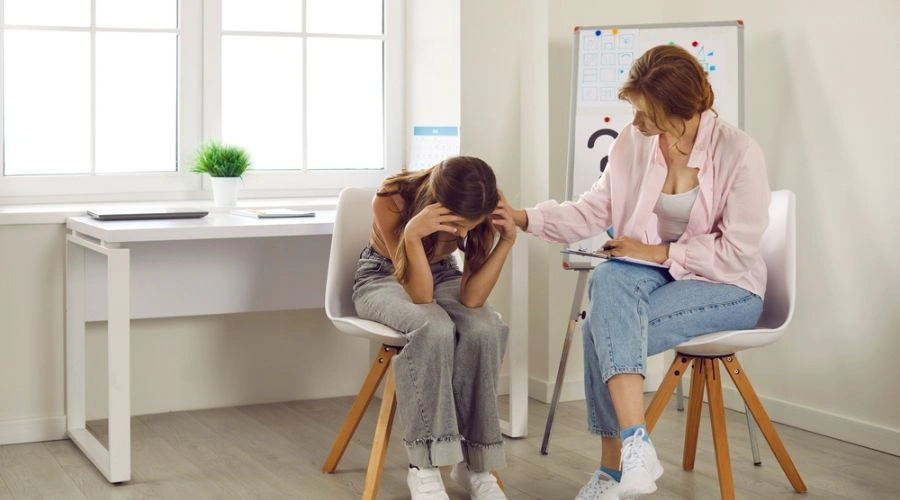
If you think your child has teen bipolar disorder, don’t panic. You can access plenty of treatment options after receiving a diagnosis from a mental health professional. Let’s discuss these options in detail:
Therapy
Therapy can make a big difference for a teenager with bipolar disorder. Therefore, it is an important part of the treatment plan. While therapy may not directly treat the condition, a therapist can help your child deal with their feelings about the diagnosis.
Talking to a therapist will help them express their feelings, improve their relationships with the people around them, and make it easier to ask for help when needed. It also teaches them to manage their symptoms in the middle of an episode.
There are various types of therapy options offered to teens with bipolar disorder. Some of them include:
Psychotherapy
This form of therapy is also known as talk therapy. It helps bipolar teenagers manage the stress that comes with their diagnosis. They can have a one-on-one session with their therapist or join a group setting with others with similar issues.
Cognitive behavioral therapy
Cognitive behavioral therapy helps improve problem-solving skills by identifying unhealthy behaviors and negative beliefs. Once your child knows what triggers their bipolar episodes, they can easily derail negative thoughts and replace them with positive ones. They also learn stress management and coping with upsetting situations.
Interpersonal and social rhythm therapy
This form of therapy is excellent for improving bipolar teen’s family life and dynamics. They can learn to avoid disruptions that may trigger an episode in their daily life.
Family-focused therapy
Sometimes, it can be hard for your loved ones to process the intense emotions of having a family member with bipolar disorder. Family-focused therapy works wonders in this scenario. It engages the entire family and encourages them to stay cohesive while facing the challenges that come with the diagnosis.
Medication
Based on your symptoms, your child’s treatment plan may also include medication. Their mental health provider will assess their symptoms to determine which medication is appropriate for them. The most commonly prescribed drugs include atypical antipsychotics and mood stabilizers.
The mental health professional may prescribe your child more than one type of drug. However, The National Institute of Mental Health recommends starting low and going slow for the best results. Most mental health professionals follow this philosophy where possible.
The doctor will start with the fewest medications at the lowest dosage to manage your child’s symptoms and increase the amount and dose whenever needed. If their doctor puts them on a medication plan, make sure that they clearly understand:
- How to take the medication?
- If there are any contraindications?
- What are the possible side effects of the drugs prescribed?
- What are the possible drug interactions?
Psychoeducation
You can learn more about bipolar disorder with psychoeducation. Actively learning about your child’s condition can help you support them better. It will help them find the right backing, stick with the treatment and prevent symptoms from returning.
How to Improve the Teen Bipolar Treatment Outcomes?

Your child can improve their condition by fully and actively participating in their treatment. Motivate them to voice their opinion and ask questions whenever they feel like it. Encourage them to partner with their healthcare provider rather than be passive treatment recipients. They can also work with their provider to set goals they both want to achieve by the end of the treatment.
Here are a few more ways to derive the best results out of teen bipolar treatment:
Be Patient
Be patient with the treatment process. Don’t expect overnight results. You may also need time to find the right program that suits your child’s needs.
Be Transparent with the Treatment Provider
You must stay in close contact with your teen’s mental healthcare provider for the best outcomes. Remember, each individual is different and requires a program that caters to their symptoms.
Therefore, if your child’s needs or condition has changed over time, effectively communicate this to their healthcare provider. They will adjust the treatment plan accordingly. Discuss any side effects your child has experienced after starting a new medication.
Take Medication as Instructed
If your child’s healthcare provider prescribes medication, ensure they take it faithfully and follow all instructions. Talk to their doctor about any symptoms, and never skip or change the dose without consultation.
Up To 100% of Rehab Costs Covered By Insurance
Get Effective Help for Teen Bipolar Disorder at Artemis
Studies show that the teens who start treatment at the onset of the disorder show better progress than those who wait. Artemis Adolescent Healing Center has an experienced team of adolescent mental health professionals. We put our best foot forward to help your child manage teen bipolar symptoms.
If you think your teen child is experiencing an acute episode of bipolar disorder, they may be a candidate for our teen rehab programs. We offer 24/7 care in a safe place to help them feel better and improve their daily life.
So don’t delay your recovery. Reach out for a confidential consultation and get details on how we can help today.
